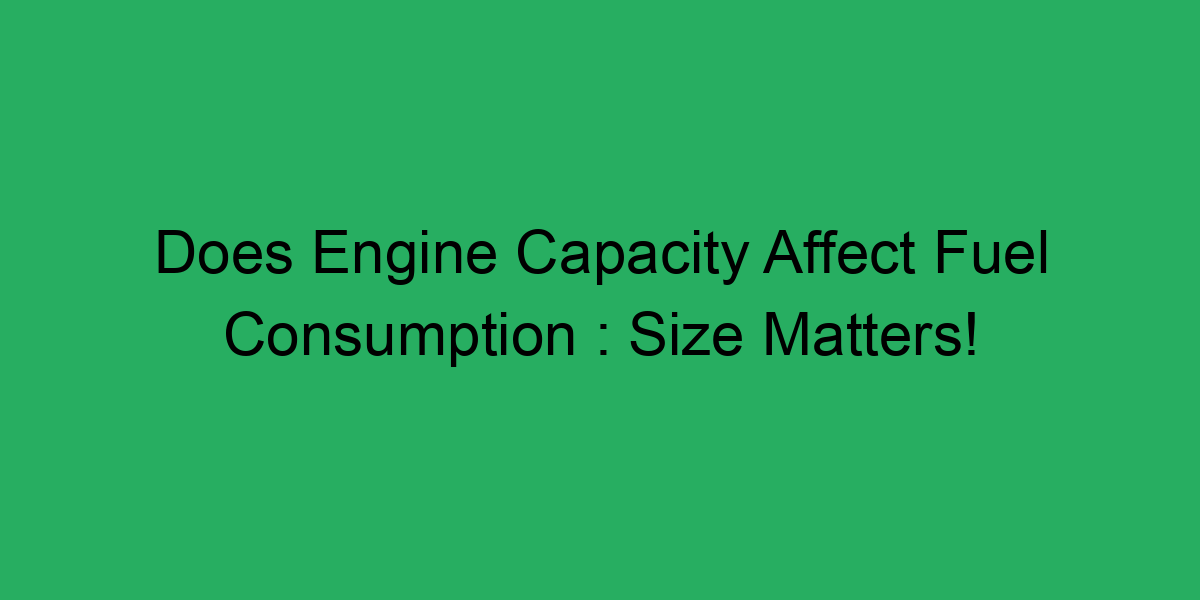When it comes to cars, one of the most critical factors influencing both performance and running costs is the engine size. Here’s a surprising fact: a car with a 4.0-litre engine can consume up to 50% more fuel than one with a 2.0-litre engine under the same driving conditions. But why does this happen, and what does it mean for your wallet and the environment? Let’s dive into the details.
Contents
Key Takeaways
- Larger Engines, More Fuel: Generally, larger engines consume more fuel due to their ability to burn more air and fuel in each cylinder.
- Performance vs. Efficiency: Bigger engines often prioritize performance over fuel efficiency, making them less economical for everyday driving.
- Technological Advances: Modern technologies, such as turbocharging, can make smaller engines as powerful as larger ones without the hefty fuel consumption.
- Weight and Load: The weight of the vehicle and the load it carries also significantly impact fuel efficiency, regardless of engine size.
- Driving Habits: Your driving habits and the type of driving you do (city vs. motorway) can greatly affect how much fuel your car consumes.
How Engine Size Affects Fuel Consumption
The Mechanics of Engine Size
Engine size, or engine capacity, is a measurement of the total volume of the cylinders in a car’s engine. This volume is typically expressed in litres (e.g., 2.0 litres) or cubic centimeters (e.g., 2000cc).
When an engine fires, the cylinders are filled with a mixture of air and fuel, which is then ignited by the spark plugs. The larger the engine, the more air and fuel can be mixed in each cylinder, resulting in more power. However, this also means that larger engines generally burn more fuel and return worse fuel economy.
Impact on Performance
A larger engine can produce more power, which translates to faster acceleration and the ability to tow heavier loads. However, this increased performance comes at the cost of higher fuel consumption. For instance, a car with a 4.0-litre engine will typically make more power than one with a 2.0-litre engine but will also consume more fuel.
Role of Modern Technologies
Modern engine technologies, such as turbocharging and direct injection, have changed the game. Smaller turbocharged engines can now produce as much power as larger non-turbocharged engines, without the significant increase in fuel consumption. This means you can get the performance you need without the hefty fuel bill.
Influence of Vehicle Weight and Load
The weight of the vehicle and the load it carries are crucial factors in fuel efficiency. A heavier vehicle may require a larger engine to move efficiently, but this does not necessarily mean it will be less fuel-efficient overall. For example, a large SUV with a powerful engine might be more efficient at moving its weight than a smaller engine struggling to do the same job.
Driving Habits and Conditions
Your driving habits and the conditions under which you drive also play a significant role. City driving, with frequent stops and starts, is less fuel-efficient than motorway driving, where the engine can run at a consistent speed. Smaller engines are often more economical for city driving, while larger engines might be more efficient for long, steady motorway journeys.
Examples and Applications
Case Study: City Cars vs. Supercars
Consider the difference between a city car like the Hyundai i10 with a 1.0-litre turbocharged engine and a supercar like the Porsche 911 with a 4.0-litre engine. The Hyundai i10 is designed for fuel efficiency, with official fuel economy figures that are significantly better than those of the Porsche 911. However, the Porsche 911 offers immense power and performance, making it ideal for those who prioritize speed over economy.
Real-World Application
If you are primarily driving in city conditions and prioritize fuel efficiency, a smaller engine with modern technologies like turbocharging would be an excellent choice. For example, the Ford Focus with a 1.0-litre EcoBoost engine offers good performance and excellent fuel economy, making it a practical option for everyday driving.
Motorway Driving
On the other hand, if you spend most of your time driving on motorways, a mid-size diesel engine could be more fuel-efficient. For instance, a car like the Volkswagen Passat with a 2.0-litre diesel engine offers strong fuel economy and sufficient power for overtaking, making it a good choice for long-distance driving.
The Bottom Line
Understanding how engine size affects fuel consumption is crucial for making an informed decision when buying a car. While larger engines offer more power, they come with higher running costs due to increased fuel consumption. By considering your driving habits, the weight and load of the vehicle, and the latest engine technologies, you can choose an engine size that balances performance and efficiency.
So, the next time you’re in the market for a new car, take a moment to think about your needs: do you prioritize power and performance, or are you looking to save on fuel costs? The right choice could make a significant difference in your wallet and the environment.

Hi, I’m Sufiyan, the developer behind this platform. I created FuelConsumptionCalculator.com to simplify fuel tracking for everyone — because understanding your vehicle shouldn’t require a degree in mechanics. I’m always working on adding more tools and content to make this site even more useful

